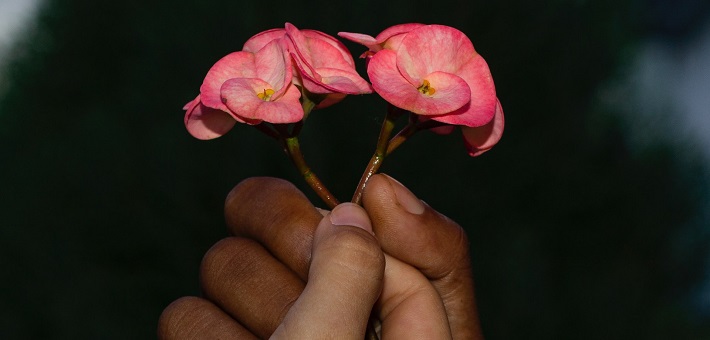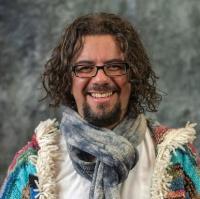Commentary on John 17:6-19
This prayer shows the proximity of the end of Jesus’ ministry.
It is as if Jesus is wrapping up his ministry by telling God what happened and what will be needed as the disciples move forward.
There is a tapestry of correlations between Jesus, God, and the people following him. Threads, patterns, and connections interweave in this ever-expanding tissue. Jesus, God, and the people following him are woven together. Through these threads flow love, care, and mutuality.
Jesus names how they are connected. What connects them is the gift of God in Jesus. The gift of God swirls together in each being, forming a chain of correlations that affirms and enacts the gift in each participant: God, Jesus, and us.
We could also say, based on what Jesus is talking about with his disciples later, that the receiving of Jesus by the people is also the work of the Holy Spirit. The Spirit will open the hearts of the people to receiving Jesus as the gift of God as they become bearers of the gift to the world. The unity of these participants shows the place where they belong, and that belonging shows the light of life that flows through these relationships. Jesus’ light was lit both by God’s light in him and also by the response of the people in accepting Jesus’ light, the light of God.
These correlations are only possible in the world, the material thread that also holds everything together. This world, created by God, is also a gift of God. Jesus came into the world to live God’s light fully. However, the world has also rejected the light of God, has denied the gift, subjugated people, and pushed down the poor, the women, and the oppressed. This is a dangerous world—so dangerous that Jesus asks God to protect his people from this world! This world of death and violence hated Jesus and his people. This world of sin tortured Jesus and put him on the cross. From this world of destitution, we indeed need protection. We live in this world but it feels like we don’t belong here because what gives life is constantly being destroyed.
However, there is a very harmful interpretation of the word “world” that understands the whole planet as the world to which we don’t belong. This interpretation denies everything that lives on earth as a gift from God. The consequence of this thinking is serious: if we are not from this world, what is the point of caring and fighting for the life of the planet? In fact, the end of this world must entail the destruction of nature, for it is a sign that the end of time is near, that God’s parousia and Jesus’ arrival is at hand.
At this point we need to make a distinction that will help us understand the world we live in and must deny and the world that we live in and must work for. Perhaps we could make a distinction between the world and earth. The world is that part of our planet that lives in patriarchal structures, necropolitics, police violence, prisons, militarization, attacks on the poor, closing of borders, some rich people getting richer while everybody else becomes poorer, and the whole destruction of the earth.
The earth is the part of the planet that has to do with our most primal sources of living, the part of who we are. We are all made of soil; those who live in sync with the natural world, who don’t live by desires of consumption but care for the poor and the animals, rivers and oceans, birds and insects, live in the earth-gift of God. When Jesus becomes human, he is both God’s gift to the earth and the earth himself.
With this distinction between world and nature, we must be careful not to get into what philosopher Alfred North Whitehead called the “bifurcation of nature into two systems of reality,” namely humans and nature. We are NOT separated. Rather, we are the extension of each other, life in fullness but also tension, death in many relations and configurations. There are many possible worlds within the earth, who is also a plural being.
Thus, what is at stake for us in this text is this: we must fight against the world of death that keeps separations and thrives on capitalism, and the power of few people who are destroying people, animals, and all living beings in this living place called Earth. This world of destitution lies in the hands of those who produce evil and of the Devil. We do not belong to that world nor do we belong to the Devil or these forms of evil, even though we can be and do evil! Because of that, Jesus called us into sanctification, which is the becoming of who we and the earth are in God: sacred people living in sacred places with all forms of sacred life, without distinction. The world of destruction has desecrated the world of God, the earth, and all its beings, including humans.
The earth of God also lives in this world of death, but our work as Christians is to be sanctified, both individually and collectively, by God. Reclaiming our sanctification in God means to become one with God, Jesus, the Holy Spirit, God’s people (which are all the people), and the world/earth of God. All are sacred and being attacked by the desacralization of life and thus at risk of disappearance. The end of the world cannot be subsumed by the end of the earth as signs of God’s second coming. We must rapidly change our eschatologies and our ways of living in sanctification so Jesus’ prayers can continue to reverberate across the earth.


May 16, 2021